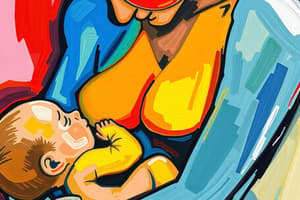Podcast
Questions and Answers
What is the primary purpose of weaning for infants?
What is the primary purpose of weaning for infants?
- To help infants sleep through the night
- To reduce the frequency of diaper changes
- To transition from bottle or breast to cup (correct)
- To introduce solid foods into the infant's diet
At what age do most infants start showing signs of readiness to wean?
At what age do most infants start showing signs of readiness to wean?
- 9 to 12 months (correct)
- 1 to 2 years
- 4 to 6 months
- 2 to 3 months
How often should a baby be bathed at the age of two to three months?
How often should a baby be bathed at the age of two to three months?
- Every day
- Only when necessary
- Once a week
- Two to three times a week (correct)
Which of the following describes cradle cap?
Which of the following describes cradle cap?
What are common signs that a baby may be teething?
What are common signs that a baby may be teething?
What does immunization refer to?
What does immunization refer to?
What is the role of emotional development in infants?
What is the role of emotional development in infants?
Why is attachment considered important for a baby?
Why is attachment considered important for a baby?
Flashcards
What is weaning?
What is weaning?
The process of transitioning from drinking from a bottle or breast to a cup.
When are babies typically ready to wean?
When are babies typically ready to wean?
Usually between nine and twelve months of age.
What is cradle cap?
What is cradle cap?
A skin condition with yellowish crusty patches on the scalp.
Define immunization.
Define immunization.
Signup and view all the flashcards
Define vaccine.
Define vaccine.
Signup and view all the flashcards
What is emotional development?
What is emotional development?
Signup and view all the flashcards
Define emotion.
Define emotion.
Signup and view all the flashcards
What is attachment?
What is attachment?
Signup and view all the flashcards
Study Notes
Weaning
- Weaning is the transition from bottle or breast to a cup.
- It's a sign of a baby's growing independence.
- There's no set time for weaning; many babies show readiness between 9-12 months.
- Signs of readiness include decreased interest in breast/bottle feeding.
Baby Clothing
- Infant clothes are often knit for comfort and flexibility.
- Clothing size is typically determined by weight rather than age.
- Clothes should not be too tight, allowing for movement.
Infant Bathing
- Around 2-3 months, babies should be bathed 2-3 times a week.
- By 7-8 months, most babies can sit steadily in the bath.
Cradle Cap
- Cradle cap is a yellowish, crusty skin condition on the scalp.
Teething
- Babies usually begin teething around 4 months old.
Diaper Changes
- The average baby needs diaper changes 12-15 times per day.
Teething Signs
- Chewing
- Excessive drooling
- Crankiness
Immunization
- Immunization is administering a small dose of a dead or weakened disease germ to build immunity.
Vaccine
- A vaccine is a disease germ, typically injected, to help the body develop immunity.
Emotional Development
- Emotional development involves learning about feelings, recognizing them, managing them, and understanding others' feelings.
Emotions
- Emotions are conscious mental reactions (e.g., anger, fear) accompanied by physiological and behavioral changes.
Basic Emotions
- Happy
- Sad
- Mad
- Fear
- Nervous
- Confused
Attachment
- Attachment is the primary way babies learn to manage feelings and actions, relying on caregivers for comfort and care.
- It is crucial for long-term emotional health.
Failure to Thrive (FTT)
- FTT is when a child doesn't get enough calories or can't properly use them, leading to stunted growth and weight gain issues.
Temperament
- Temperament refers to a person's usual attitude, mood, and behavior.
Studying That Suits You
Use AI to generate personalized quizzes and flashcards to suit your learning preferences.




